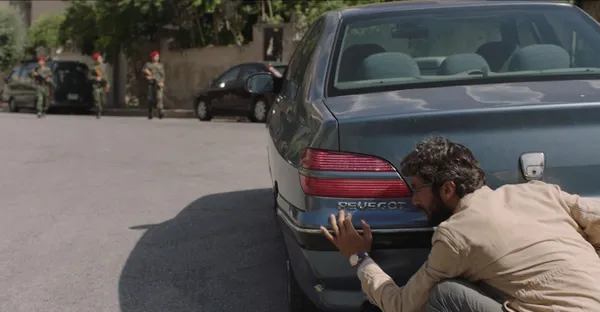Eye For Film >> Movies >> The Translator (2020) Film Review
The Translator
Reviewed by: Amber Wilkinson

The macro politics of Syria meet the personal story of exile in this impressive debut from writer/directors Rana Kazkaz and Anas Khalaf that is carefully poised between family drama and thriller. The directors bring us up to speed with the life of Sami Najjar (Ziad Bakri) at pace, showing him, in 1980, becoming witness to the "disappearance" of his father at the hands of the police. Twenty years later, it is he who faces an existential threat when he makes a mistake at the Sydney Olympics that will lead to political exile from his homeland. The prologue serves not only as an introduction to Sami but also an indicator of the ongoing turbulence in Syria as, now in 2011, we catch up with Sami as the Middle East is in the middle of the Arab Spring.
Now married to Julie (Miranda Tapsell, probably best known to UK audiences from indie romcom Top End Wedding), he works with journalist and long-time friend Chase (David Field) to bring stories of political oppression in his homeland to a global audience. Things become personal, however, when he hears that his brother has now been scooped up by government forces and he takes the risky step of returning to his homeland in a bid to find him.

Once the engine of the plot is juiced, with Sami back in Syria, the film is off and running at a tense gallop, with the directors quickly establishing that death is a constant possibility, whether you're trying to find your brother or simply walking to the shop. This sense of their being no hiding place is added to by the wall of long-brewing anger Sami finds himself up against when he turns up on the doorstep of his sister Karma (Yumna Marwan), who holds him in disdain. The film takes time to show that this resentment is composed of the layer Karma is consciously aware of - the fact that she believes her brother is only happy to be a mouthpiece for others - and the more subconscious feeling of abandonment from his exile and the knowledge that, now he is an Australian citizen, he can still evacuate from Syria when he wants to.
Sami's brother's heavily pregnant wife Loulou (Sawsan Arsheed) is more sympathetic towards him but adds to his own feelings of guilt at having left the country when the rest of his family were unable to do so.Kazakaz and Khalaf, who have already established themselves as short filmmakers of note with the likes of Mare Nostrum (2016) have no problem stepping up to the longer format, producing a complex emotional work that doesn't stint on the suspense element. It's also notable that where many other filmmakers who have set films in Syria zoom in on the violence, the directors here concentrate more on the pervasive sense of dread, leaving much to the viewer's imagination. Violence is certainly happening, dead bodies are turning up, but the fact that almost all of this happens off screen or in shadows serves to further illustrate the impact of the constant sense of threat on the regular citizens, something cinematographer Eric Devin accentuates with camerawork that also feels deliberately twitchy and shot on the fly. "Violence will always win," says one character. We hope that's not true, but the evidence continues to be stark.
Reviewed on: 03 Dec 2020
















